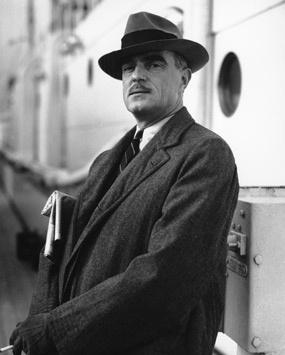Wilder Trivia - Did You Know ...
 … that Thornton Wilder had Scottish and English roots, and among his American ancestors were a dentist who was also an oil cloth manufacturer; a co-founder of the American Anti-slavery Society; a builder/architect who helped construct the Brooklyn Navy Yard; a Presbyterian minister; the pipe-smoking wife of a British sea captain, and a number of other independent women? But writers? We know of none–as of now.
… that Thornton Wilder had Scottish and English roots, and among his American ancestors were a dentist who was also an oil cloth manufacturer; a co-founder of the American Anti-slavery Society; a builder/architect who helped construct the Brooklyn Navy Yard; a Presbyterian minister; the pipe-smoking wife of a British sea captain, and a number of other independent women? But writers? We know of none–as of now.
 … that his parents’ generation and his own made up for this lack? His father was a journalist and well-known public speaker, and one of the first Ph.D’s in the field we now know as political science in this country. His mother was a poet and translator. Four of the five talented Wilder children worked in multiple literary forms: Poetry (three); fiction (three): drama (two); translations (two). In addition, one was an editor, one was a Biblical scholar, and the fifth and youngest Wilder published in the field of zoology and became a leading equestrian and conservationist.
… that his parents’ generation and his own made up for this lack? His father was a journalist and well-known public speaker, and one of the first Ph.D’s in the field we now know as political science in this country. His mother was a poet and translator. Four of the five talented Wilder children worked in multiple literary forms: Poetry (three); fiction (three): drama (two); translations (two). In addition, one was an editor, one was a Biblical scholar, and the fifth and youngest Wilder published in the field of zoology and became a leading equestrian and conservationist.
 … that Wilder was the survivor of a stillborn twin brother, was passionately interested in twins, and wrote about twins in his fiction and drama? Twins are mentioned in such Wilder’s plays as Our Town and Such Things Happen Only in Books, but appear perhaps most notably in his fiction in The Bridge of San Luis Rey, and in Theophilus North, which he saw in part as the fictionalized story of his dead twin.
… that Wilder was the survivor of a stillborn twin brother, was passionately interested in twins, and wrote about twins in his fiction and drama? Twins are mentioned in such Wilder’s plays as Our Town and Such Things Happen Only in Books, but appear perhaps most notably in his fiction in The Bridge of San Luis Rey, and in Theophilus North, which he saw in part as the fictionalized story of his dead twin.
 … that while Wilder was born in Wisconsin and raised in California, he also spent some of his boyhood in north China? Did you also know that he studied at Oberlin College, graduated from Yale, and then received a master’s degree in French from Princeton? Or that as a teenager and a college student, he spent his summers working on farms in California, Kentucky, Massachusetts, Connecticut and Vermont?
… that while Wilder was born in Wisconsin and raised in California, he also spent some of his boyhood in north China? Did you also know that he studied at Oberlin College, graduated from Yale, and then received a master’s degree in French from Princeton? Or that as a teenager and a college student, he spent his summers working on farms in California, Kentucky, Massachusetts, Connecticut and Vermont?
 … that by the time he graduated from college he had published more than thirty pieces, including poetry, drama, fiction, non-fiction, theatre reviews, critical reviews and essays, and had won prizes for fiction, drama and an essay?
… that by the time he graduated from college he had published more than thirty pieces, including poetry, drama, fiction, non-fiction, theatre reviews, critical reviews and essays, and had won prizes for fiction, drama and an essay?
 … that Wilder was a talented musician, studying piano, organ and violin; he sang in choral groups and church choirs; and over the course of his lifetime, he read musical scores as an avocation? (He was very proud of his capacity to hear the entire orchestra in his head). He also wrote the librettos for two operas based on his work–The Long Christmas Dinner and The Alcestiad.
… that Wilder was a talented musician, studying piano, organ and violin; he sang in choral groups and church choirs; and over the course of his lifetime, he read musical scores as an avocation? (He was very proud of his capacity to hear the entire orchestra in his head). He also wrote the librettos for two operas based on his work–The Long Christmas Dinner and The Alcestiad.
 … that other enthusiasms which fed his art and probably consumed months and perhaps even years of his time and energy ranged from the study German theatrical records to James Joyce’s Finnegans Wake to the plays of Lope de Vega to Greek vase painting?
… that other enthusiasms which fed his art and probably consumed months and perhaps even years of his time and energy ranged from the study German theatrical records to James Joyce’s Finnegans Wake to the plays of Lope de Vega to Greek vase painting?
 … that besides acting in his own plays in summer stock - and once even briefly on Broadway--Wilder was at home on the stage as a nationally celebrated teacher, lecturer and cultural emissary in Europe and Latin America?
… that besides acting in his own plays in summer stock - and once even briefly on Broadway--Wilder was at home on the stage as a nationally celebrated teacher, lecturer and cultural emissary in Europe and Latin America?
 … that although Wilder built a house for himself, his parents and his sisters with royalties from The Bridge of San Luis Rey, he used it as a home base from which he traveled the world, sometimes spending as many as two hundred days each year away from home, and that he wrote in cities and towns all over the world? Among his favorite places were Zurich, Switzerland; Baden-Baden, Germany; Juan-les-Pins, France; the MacDowell Colony in Peterborough, New Hampshire; Taos , New Mexico; Tucson, Arizona; Stockbridge, Massachusetts; and Newport, Rhode, Island.
… that although Wilder built a house for himself, his parents and his sisters with royalties from The Bridge of San Luis Rey, he used it as a home base from which he traveled the world, sometimes spending as many as two hundred days each year away from home, and that he wrote in cities and towns all over the world? Among his favorite places were Zurich, Switzerland; Baden-Baden, Germany; Juan-les-Pins, France; the MacDowell Colony in Peterborough, New Hampshire; Taos , New Mexico; Tucson, Arizona; Stockbridge, Massachusetts; and Newport, Rhode, Island.
 … that you can trace his travels by looking at where he did his work? The Bridge of San Luis Rey for example, was composed in London, Naples, Munich, Berlin, Paris, Juan-les-Pins and New Haven, and on ships at sea, and was finished at the YMCA in Newport, Rhode Island, in July 1927. Wilder wrote significant parts of Our Town in Europe (especially in the village of Ruschlikon outside Zurich), The Skin of Our Teeth in Quebec, and The Eighth Day in Douglas, Arizona. He enjoyed traveling to Europe to write in "spas in off-season" He especially liked to write aboard ships at sea, explaining "Baby does best on boats."
… that you can trace his travels by looking at where he did his work? The Bridge of San Luis Rey for example, was composed in London, Naples, Munich, Berlin, Paris, Juan-les-Pins and New Haven, and on ships at sea, and was finished at the YMCA in Newport, Rhode Island, in July 1927. Wilder wrote significant parts of Our Town in Europe (especially in the village of Ruschlikon outside Zurich), The Skin of Our Teeth in Quebec, and The Eighth Day in Douglas, Arizona. He enjoyed traveling to Europe to write in "spas in off-season" He especially liked to write aboard ships at sea, explaining "Baby does best on boats."
 … that he translated and/or adapted the work of such playwrights as Ibsen, Sartre, George Farquhar, Johann Nestroy, Otto Indig and André Obey; translated plays from German and French; gave lectures in those languages; and was proud to have read Don Quixote in four languages–English, French, German and Spanish?
… that he translated and/or adapted the work of such playwrights as Ibsen, Sartre, George Farquhar, Johann Nestroy, Otto Indig and André Obey; translated plays from German and French; gave lectures in those languages; and was proud to have read Don Quixote in four languages–English, French, German and Spanish?
 … that he went to Hollywood to work on screenplays, winning a major on-screen credit for his script for Alfred Hitchcock’s famous film, Shadow of a Doubt?
… that he went to Hollywood to work on screenplays, winning a major on-screen credit for his script for Alfred Hitchcock’s famous film, Shadow of a Doubt?
 … that Wilder served a brief three-month enlistment in the Army's Coast Artillery Corps at Fort Adams, Rhode Island in World War I (rising to the rank of corporal), and volunteered for service in World War II in 1942, at the age of 45? For his World War II service as an Army Air Force Intelligence officer in North Africa and Italy (rising to lieutenant colonel), he received the Bronze Star, the Legion of Merit, the Chevalier Legion d’Honneur, and an honorary officership in the Military Order of the British Empire (M.B.E.).
… that Wilder served a brief three-month enlistment in the Army's Coast Artillery Corps at Fort Adams, Rhode Island in World War I (rising to the rank of corporal), and volunteered for service in World War II in 1942, at the age of 45? For his World War II service as an Army Air Force Intelligence officer in North Africa and Italy (rising to lieutenant colonel), he received the Bronze Star, the Legion of Merit, the Chevalier Legion d’Honneur, and an honorary officership in the Military Order of the British Empire (M.B.E.).
 … that from the time he was a boy, writing letters was not a duty or a diversion but a major part of his creative life as an artist? He wrote some seven thousand letters that we know of, and probably many, many more. Three volumes of his letters have been published since his death: The Selected Letters of Thornton Wilder (2008); A Tour of the Darkling Plain: The Finnegans Wake Letters of Thornton Wilder and Adaline Glasheen (2001); and The Letters of Gertrude Stein & Thornton Wilder(1996).
… that from the time he was a boy, writing letters was not a duty or a diversion but a major part of his creative life as an artist? He wrote some seven thousand letters that we know of, and probably many, many more. Three volumes of his letters have been published since his death: The Selected Letters of Thornton Wilder (2008); A Tour of the Darkling Plain: The Finnegans Wake Letters of Thornton Wilder and Adaline Glasheen (2001); and The Letters of Gertrude Stein & Thornton Wilder(1996).

